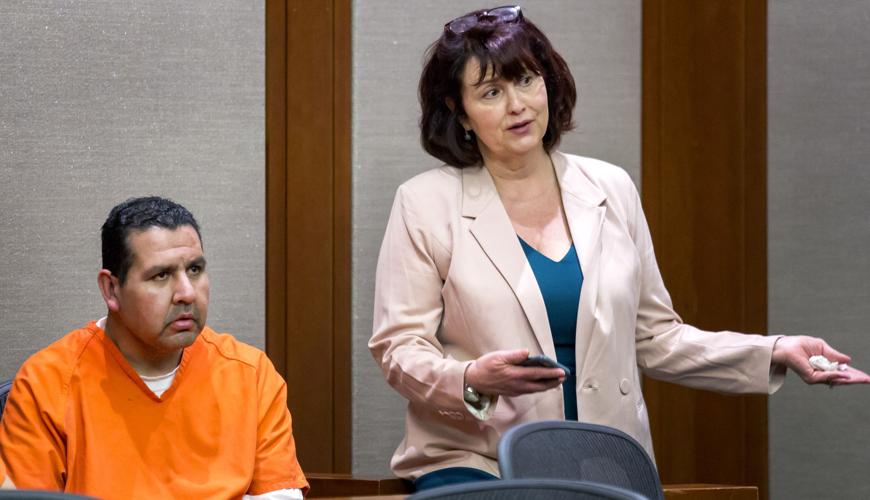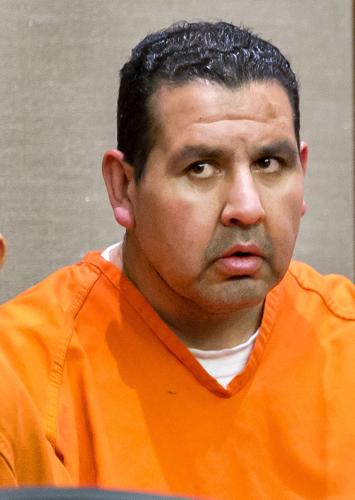Editor's note: This story was originally published Sept. 13. The hearing for Paul Alvarez Sr. mentioned in this story has been postponed. The story has been changed to reflect that.
A Pima County judge will decide whether a man facing first-degree murder charges is competent to stand trial or whether his charges will be dismissed.
Paul Alvarez Sr. admitted to firing 12 shots at Vashaun Verrell Baker in October 2018 after Baker wrestled and punched Alvarez’s son during a pickup basketball game outside Christ Church United Methodist on Tucson’s east side.
After the shooting, Alvarez told police he was a registered executioner and had previously been to prison for killing people, which wasn’t true. He also told officers he had been on death row in a Florence prison for six minutes before he was released, according to Arizona Daily Star reporting.
In order to be considered competent, defendants must be able to understand their trial proceedings. A person can be found not competent due to intellectual or mental health disabilities that prevent them from assisting in their trial.
If Pima County Superior Court Judge Michael Butler finds Alvarez not competent, that will put Alvarez among nearly 250 people in the last decade whose felony cases have been dismissed after they were found not competent to stand trial and who mental health experts deemed their competence was considered not restorable.
Once a defendant’s charges are dropped, there are some ways a person can receive mental health treatment.
A judge can order proceedings for court-ordered mental health treatment, but there’s no guarantee someone will follow through with outpatient treatment, and defendants are only committed to the state psychiatric hospital after a chronic unwillingness to receive treatment.
Restoring competency
Since 2010, there have been more than 241 felony cases in Pima County where the defendant was considered not competent and not restorable.
When a defendant’s competency is questioned, a judge requests a mental health evaluation from two doctors who each make $500 per evaluation.
In February 2019, the court ruled Alvarez was incompetent for trial but could be restored. One doctor who evaluated him said Alvarez was likely suffering from a delusional disorder or an ongoing psychotic disorder, both of which could be treated with medication. The same doctor said it was also possible Alvarez was faking mental health illness symptoms to avoid consequence.
Last December, the jail’s doctor issued a final report saying Alvarez is not competent and not restorable.
On Jan. 3, the Pima County Attorney’s Office asked that a doctor selected by the state conduct his own exam on Alvarez. That’s what will happen during Monday’s hearing.
Alvarez can no longer participate in a program intended to restore his competency to stand trial because jail doctors already issued a final determination. He spent 10 months in the competency restoration program before that final determination.
A defendant’s competency can be evaluated if they have a mental illness or a cognitive issue that keeps them from understanding the charges brought against them in court.
“If somebody has some other organic problem, they’ve had a stroke, they have dementia, you can’t restore somebody that has one of those issues,” said Pima County Judge Deborah Bernini, who served as Pima County Mental Health Court judge from 2011 to 2015. “And that’s where many of the non-competent, not restorables come in.”
Michelle Christiansen, criminal justice mental health clinical coordinator for Pima County Superior Court, said most cases where a defendant is considered not restorable involve an intellectual disability, not a mental health disability.
Restorability does not mean a defendant’s mental illness is treated. It only requires that the defendant understand the charges brought against them and that they’re able to assist their attorney in their defense.
“Just because you have schizophrenia does not mean you would be found not competent,” said Dr. Peter Shibuya, a court-certified psychologist.
He and his wife, Dr. Luanna Bozzolo, are two of more than two dozen forensic evaluators that work with Pima County courts.
If at least one doctor says the defendant is not competent but can be restored, the judge almost always orders the defendant to a restoration program, Bernini said.
Mental health evaluators and educators work with the defendant to make sure they understand the possible pleas and what they’re able to consider for a plea bargain. They ensure the defendant knows who’s who in a courtroom and knows their legal rights.
If a defendant is in jail awaiting trial, psychologists and psychiatrists work with courtroom educators to restore competency. If the defendant is out of custody, doctors work directly with defendants to cover all the requirements, Bozzolo and Shibuya said.
How the program works
In a restoration to competency program, defendants are given assessment and IQ tests to ensure they understand their charges and to ensure their mental health illness does not interfere with that understanding. Bozzolo said she has also used 3D models of a courtroom and quizzes to make sure defendants understand how the legal proceedings work.
During the restoration to competency program, the judge will hold hearings to check the status of the defendant. At any point during the restoration program, the jail psychologist can say the defendant can not be restored within the 15 months allowed by law, Bernini said.
If a person cannot be restored, a judge has to consider dismissing the case and releasing the defendant from custody.
When a judge rules a defendant’s competency cannot be restored and the offense is not considered sexually violent, they have three options:
- Order proceedings for court-ordered mental health treatment;
- Order guardianship proceedings;
- Dismiss the case and release the defendant back into the community
In Lisa Surhio’s 15 years as an assistant public defender for Pima County, she has never seen guardianship proceedings result in a defendant getting a guardian, at least for the cases that go through the public defender’s office, she said.
A defendant with a cognitive defect could get a court-ordered guardian to manage their money and use it to place them in a secure home where they could receive treatment, Surhio said. But most defendants assigned to a public defender don’t have that kind of money.
Court-ordered mental health treatment is not exclusive to people accused of a crime. Any person can request an evaluation for a person who is not willing to get voluntary mental health treatment.
A person must be a danger to themselves or others, persistently or acutely disabled or gravely disabled for the court to order treatment.
If Judge Butler rules Alvarez’s competency cannot be restored, he could order proceedings for court-ordered treatment.
Bernini says it’s difficult to commit a defendant to court-ordered treatment because mental health experts assess whether the person is a danger to themselves or others only during the assessment. Evaluators can’t guess whether the person will be a danger in the future based on past behavior, she said.
If mental health experts do decide a person is a danger to themselves or others, they go through a year-long court order combining inpatient and outpatient treatment depending on whether a person is well enough to be treated outside a hospital.
Many defendants who are found nonrestorable are already on a court-ordered civil commitment, making that option no longer available for a judge, Surhio said.
Ending a cycle
Defendants who are not appointed a guardian and are not civilly committed simply return to the community with no guarantee they will receive treatment or find stability. Sometimes, they find themselves back in court repeatedly.
Surhio believes people with mental health illness wouldn’t be cycled through the criminal justice system as often if there were better mental health resources in the community.
She said she doesn’t think the problem comes from existing laws or the criminal justice system but rather from a lack of resources in mental health.
“Mental illness is a public health issue,” Surhio said. “The fact that we expect police officers and courts to treat that and manage that is kind of insane.”
Surhio said she would like to see a mental health system where people are getting the services they need. She said it’s the community’s job to take care of mentally ill people, not just incarcerate them.
“The answer is not to pass more criminal laws and keep more people in jails and prisons,” Surhio said.
“The answer ought to be that we have better mental health treatment for those people. Because that’s how you’re going to stop them from reoffending is to help them be well and be supported.”
Prosecutors: Bill would close “loophole”
Prosecutors in Pima County and across the state have been lobbying for a state bill that would get a defendant into a mental health institution if they are found not competent and nonrestorable and if they committed a serious crime and are a danger to the community. The bill has been proposed for several years but has stalled in the state Legislature.
In March it passed the Arizona House of Representatives with a 55-5 vote, but the Senate did not take action on it.
The proposed bill would make it so that the defendant goes through a trial, but not a criminal trial.
It would require proof that the defendant committed the offense by clear and convincing evidence — instead of the tougher standard of beyond a reasonable doubt — and that the defendant poses a continuing danger to the community, said Jonathan Mosher, chief criminal deputy at the Pima County Attorney’s Office.
If both guilt and continuing danger were proven, the court would place the defendant in a secure facility approved by the state.
Mosher said the county attorney’s office has identified 52 cases in the last 10 years of people who were found incompetent and nonrestorable who they think were serious and dangerous offenders. Two cases in the last 10 years involved a first-degree murder charge.
Mosher said the biggest setback that has kept the bill from passing is the cost.
The state Legislature has not been able to decide who would fund the defendant’s treatment and stay in a facility.
“These are people who pose a risk, committed a serious offense and are currently escaping any accountability whatsoever,” Mosher said.
The bill was modeled after similar bills in other states that have been challenged on constitutional grounds but were upheld, he said.
Jared Keenan, criminal justice attorney with the ACLU Arizona, said the bill would only make it easier for prosecutors to lock people up in a hospital instead of helping them avoid the criminal justice system.
Keenan said “clear and convincing evidence” is a much easier burden of proof for prosecutors to meet than “beyond a reasonable doubt” and could lead to dangerous consequences.
“From my experience, prosecutors overuse every tool that they’re given,” Keenan said.
Instead, the state should take all the money it would have spent on the program and instead invest in mental health care in the community to prevent people from getting into the criminal justice system in the first place.
“Locking people up, particularly if you’re locking them up because of their mental health illness, we should make that the absolute last resort and try to do everything we can on the front end to make sure that people don’t get in that situation,” Keenan said.
“This bill seems to ignore the front end problem and focus solely on a solution on the back end and the solution proposed is to lock more people up.”
The benefit to society would exceed the cost, Mosher said.
A defendant would not be in a facility longer than the maximum sentence of his offense, and the defendant would be entitled to a review hearing every year to assess whether they are no longer dangerous to the community.
“When you’re talking about people who pose a serious dangerous risk to the community,” Mosher said, “you can’t put a cost on that.”








